
real
meditation
in minutes a day

Wisdom Publications, Inc.
199 Elm Street
Somerville MA 02144 USA
www.wisdompubs.org
2008 by Joseph Arpaia and Lobsang Rapgay
All rights reserved. No part of this book may be reproduced in any form or by any means, electronic or mechanical, including photography, recording, or by any information storage and retrieval system or technologies now known or later developed, without permission in writing from the publisher.
Library of Congress Cataloging-in-Publication Data
Arpaia, Joseph.
Real meditation in minutes a day : optimizing your performance, relationships, spirituality, and health / Joseph Arpaia, Lobsang Rapgay.
p. cm.
Includes bibliographical references and index.
ISBN 0-86171-556-X (pbk. : alk. paper)
1. MeditationBuddhism. I. Lobsang Rapgay. II. Title.
BQ5612.A77 2008
294.34435dc22
2008012116
12 11 10 09 08
5 4 3 2 1
Cover design by Pema Studios. Interior design by Dede Cummings. Set in New Caledonia 11.5/15.5.
Wisdom Publications books are printed on acid-free paper and meet the guidelines for permanence and durability of the Production Guidelines for Book Longevity of the Council on Library Resources.
Printed in the United States of America.
 This book was produced with environmental mindfulness. We have elected to print this title on 30% PCW recycled paper. As a result, we have saved the following resources: 23 trees, 16 million BTUs of energy, 2,053 lbs. of greenhouse gases, 8,524 gallons of water, and 1,095 lbs. of solid waste. For more information, please visit our website, www.wisdompubs.org. This paper is also FSC certified. For more information, please www.fscus.org.
This book was produced with environmental mindfulness. We have elected to print this title on 30% PCW recycled paper. As a result, we have saved the following resources: 23 trees, 16 million BTUs of energy, 2,053 lbs. of greenhouse gases, 8,524 gallons of water, and 1,095 lbs. of solid waste. For more information, please visit our website, www.wisdompubs.org. This paper is also FSC certified. For more information, please www.fscus.org.
from Joseph Arpaia
I would like to dedicate this work
to my late cousin, Kathy Mazza
from Lobsang Rapgay
I would like to dedicate this work
to the late junior tutor to His Holiness the Dalai Lama,
Kyabje Trijang Dorje Chang (19001981),
and my late father Karma Wangchuk
and mother Pasang Lhamu.
contents
real
meditation
in minutes a day

THE DALAI LAMA
foreword
T HROUGH MEDITATION, we can train our minds in such a way that their negative qualities are abandoned and their positive qualities are generated and enhanced. In general, we talk about two types of meditation: analytical and single-pointed. First, the object of meditation is put through a process of analysis in which we repeatedly attempt to gain acquaintance with the subject matter. When we have gained confidence about the object of meditation, the mind is made to concentrate on that without further analysis. This combination of analytical and concentrative meditation is an effective technique for properly training our minds.
The importance of this practice arises from the fundamental fact that each and every one of us innately desires happiness and does not want misery. Whether we experience happiness or sorrow in life depends largely on the state of our minds. Furthermore, the way in which the experiences we encounter affect our lives also depends on the mind. When we misuse our mental potential, we make mistakes and suffer unpleasant consequences. On the other hand, when the minds potential is skillfully harnessed, we derive positive and pleasant results.
The authors of this book, Joseph P. Arpaia and Lobsang Rapgay, have drawn on the Tibetan Buddhist traditions of meditation and on an understanding of Western cognitive psychology to present meditative practice in a way that readers will find is actually effective. I congratulate them for their efforts, and offer my prayers that readers who employ these techniques will indeed be successful in increasing a sense of peace and happiness in their own lives, thereby contributing to greater peace and happiness in the world at large.

His Holiness the Fourteenth Dalai Lama,
Tenzin Gyatso
meditation:
what it is, and how this book will teach you to do it
meditate.verb. (1) Exercise the mental faculties in thought or contemplation. (2) a. Muse over, reflect; consider; study; ponder. Also, plan by turning over in the mind, conceive mentally. b. Fix ones attention on; observe intently or with interest.
Shorter Oxford English Dictionary, Fifth Edition
M EDITATION is exercise for your mind. Just as exercise for your body improves your physical abilities, meditation will improve your mental abilities. Meditation enhances whatever you do with your mind: it helps you perceive more clearly, it improves your thinking and memory, and it enhances your creativity. You develop your mind into an ever more effective tool for living.
There are many myths about meditation, which can interfere with our ability to use it effectively; so lets make clear what meditation is not.
MEDITATION: THE MYTHS
Myth 1: Meditation is Eastern.
Meditation has been practiced by Christians for almost two thousand years, and Jews, Muslims, and those of other traditions have meditative practices as well. Even if many meditation techniques come from Eastern traditions, there is nothing to prevent others from adopting those techniques to develop their minds.
Myth 2: Meditation is for religious people.
You do not have to be religious to benefit from meditation, just as you do not have to be an athlete in order to benefit from physical exercise. Meditation is exercise for the mind. You can use it for spiritual development. You can also use it to improve your health, your effectiveness at work, and your relationships with others.
Myth 3: Meditation takes hours per day.
If you have hours to spend, then you can certainly spend them meditating. But you dont need hours to benefit from meditating. In fact, even fifteen or twenty minutes per day will help you significantly.
Myth 4: Meditation is relaxation.
Meditation can help you learn to relax. However, sometimes you need to feel more energized. There are meditations that can help you speed up when you need to speed up, and meditations that can help you slow down when you need to slow down.
Myth 5: Meditation is stopping thoughts.
Meditation teaches you how to change your usual thoughts so you can think differently, and more effectively. Meditation also develops mental activities such as perceiving or imagining, which are different from thinking.
Myth 6: Meditation is blanking out the mind.
Meditation is training the mind. You meditate in order to develop your mind, not blank it out.
Myth 7: Meditation is used by cults.
Cults use the myth that meditation involves blanking out the mind to disguise brainwashing techniques as meditation. Since meditation strengthens the mind, and the minds ability to inquire and analyze, meditation is, in fact, a good antidote to cult techniques.
Next page
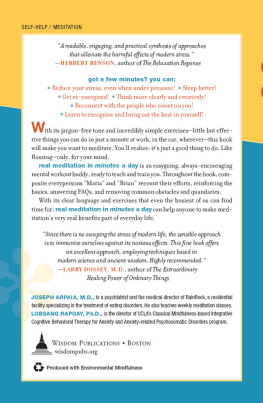
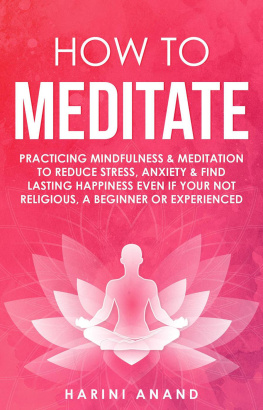


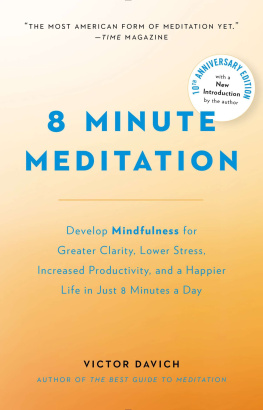



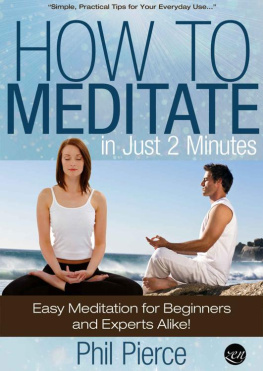
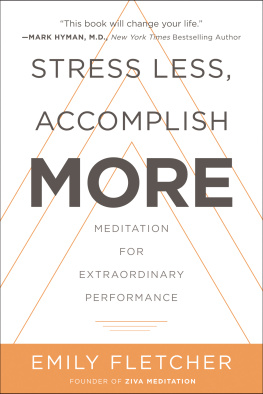
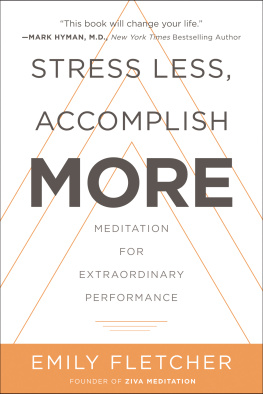


 This book was produced with environmental mindfulness. We have elected to print this title on 30% PCW recycled paper. As a result, we have saved the following resources: 23 trees, 16 million BTUs of energy, 2,053 lbs. of greenhouse gases, 8,524 gallons of water, and 1,095 lbs. of solid waste. For more information, please visit our website, www.wisdompubs.org. This paper is also FSC certified. For more information, please www.fscus.org.
This book was produced with environmental mindfulness. We have elected to print this title on 30% PCW recycled paper. As a result, we have saved the following resources: 23 trees, 16 million BTUs of energy, 2,053 lbs. of greenhouse gases, 8,524 gallons of water, and 1,095 lbs. of solid waste. For more information, please visit our website, www.wisdompubs.org. This paper is also FSC certified. For more information, please www.fscus.org. THE DALAI LAMA
THE DALAI LAMA